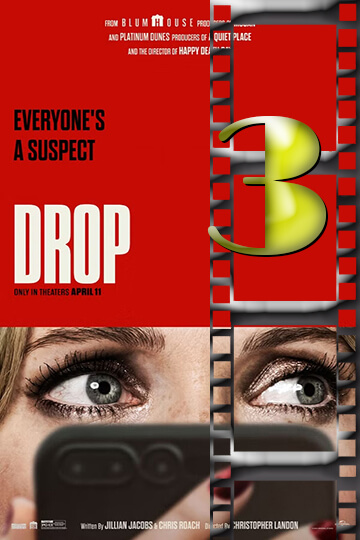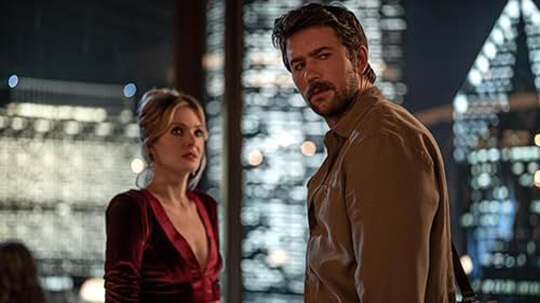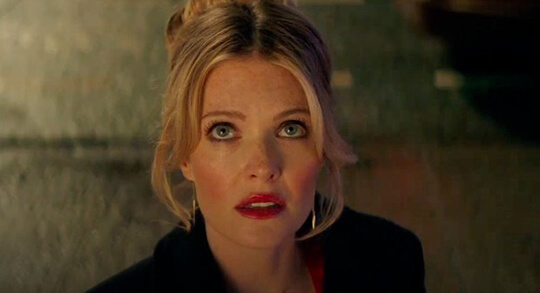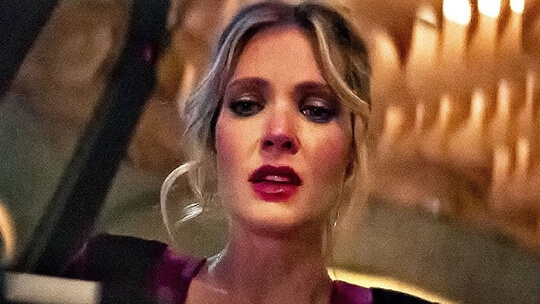
What’s It About
Violet is a widowed mother who goes to an upscale restaurant to meet Henry, her charming and handsome date. However, her pleasant evening soon turns into a living nightmare when she receives phone messages from a mysterious, hooded figure who threatens to kill her young son and sister unless she kills Henry.



MOVIESinMO REVIEW
The Blumhouse thriller by Christopher Landon, “Drop,” begins with a compelling idea but soon falls apart into something much less believable. Featuring Meghann Fahy (The White Lotus), the movie is about Violet, a widow and victim of domestic abuse who is an online counselor. The film is about her terrible first date, which turns into a nightmare when she starts receiving threatening messages on an app named DigiDrop. The setup looks good—a contemporary spin on the single-setting thriller in the style of “Panic Room” or “Flightplan.” Violet goes to an upscale high-rise eatery named Palate to meet Henry (Brandon Sklenar), a photographer for Chicago’s mayor. At home, her sister, Jen (Violett Beane), watches Violet’s five-year-old son, Toby, in their surprisingly affluent suburban house. As soon as the date begins, Violet starts receiving threatening messages anonymously through her phone. The threatening messages grow quickly: kill Henry, or her son will be killed. Out of the huge security camera system installed within her house, she is able to see a masked trespasser hanging out around her house, justifying the threat. A cat-and-mouse game of high tension ensues as Violet tries to determine how far she will go to rescue her child. The biggest problem with the film is its credibility pushed to the limit. Henry somehow is oblivious of Violet’s increasingly agitated phone-checking and running around the restaurant during their evening out. It tests credulity that he would wait so long. The screenplay has the bizarre choice of introducing itself to nearly every individual present in the restaurant, from the bartenders to a pianist, as if forewarning one that any of them could be the villain but none actually overcome brief interactions other than an up-and-coming comedian waiter. Director Landon, famous for “Happy Death Day” and “Freaky,” attempts to build suspense through current technology by displaying messages in large on-screen font. The effort fails. The over-reliance on security cameras and the evil-doer’s ability to tap into infinite cameras pushes the boundaries of plausibility. Tension that deserves to be built throughout is forced instead of organic. Fahy is comfortable with the material, however, and she provides emotional depth to Violet. Her character’s past as an abuse victim provides some depth, though, although these flashbacks sometimes feel exploitative instead of meaningful. Unfortunately, she has no chemistry with Sklenar’s Henry, partly because his character is not given any or little development. He’s lifeless and bland, only there in the restaurant because the narrative requires him to be. The film soon devolves into overkill in its climax. What began as a tense thriller devolves into something that’s akin to a slasher movie. Women are by far the victims of violence—being beaten, thrown, shot, and stabbed. Of these sequences of violence, we mostly see people staring nervously at their mobile phones, creating an uncomfortable cadence to events. “Drop” ends up not knowing itself what kind of film it wants to be. It tries its best to pursue heavy concepts concerning breaking cycles of violence along with also giving exploitation-style thrills. Tonality inconsistency generated further leads to disjointedness when watching the movie. By the time we arrive at the climactic villain reveal, it utterly flops—we hardly recognize the masked figure. The film does manage to produce some genuine tension in its best moments. The will-she-or-won’t-she tension is well established in certain scenes, and Fahy’s performance keeps us invested regardless of the ridiculous situations her character finds herself in. The frantic speed of the threats has a white-knuckle atmosphere that holds one’s attention despite the increasingly bizarre premise. And there are the unintentionally laughable moments, like the manner in which the protagonists never take their expensive-looking entrees with their hands amid the life-or-death situation. And Henry’s cardinal sin of requesting Kobe beef medium seems to be a flag waving in one’s face which the script refuses to touch on. The Chicago setting is not much used, being purely in the background rather than an integral part of the action. The restaurant set piece, while nice to behold (sitting on top of a skyscraper), is a looks-too-contrived location from an earlier rom-com with a tired prom night party underway. At its core, “Drop” attempts to be a movie about a good woman finding out how to escape a pattern of violence, with revenge fantasies woven throughout. It tries to place itself amongst such movies as “Ready or Not” or maybe even “Kill Bill,” but lacks the witty banter and distinct style sense that will elevate it above its B-movie trappings. The excessive use of phone screens turns a potential gimmick, or sometimes an interesting storytelling device, into a crutch. Director Christopher Landon seems to take shortcuts, applying tricks he’s seen in better thrillers without adding anything. Even with a longer runtime could fix things the scenes felt like they were dragging, and the pacing was inconsistent. The climax and final twist all felt rushed and disappointingly cheap. While “Drop” puts you on edge throughout its duration, it does so in much the same manner as a car accident would—it’s hard not to watch the catastrophe happen, even as you realize how silly it is. The film squanders what it has, offering up a thriller that, ironically, drops the ball on all but one of the good points it establishes.
OUR RATING – A BAD CONNECTION 3

